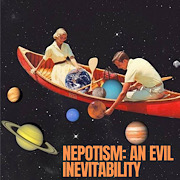|
ChrisHansen posted:I'm right here with ya. It sounds like some hippy dippy bologna, but I think "the power of positive thinking" is a real thing. I worked in a psychiatric hospital, and the nature of the medicine was that it did not always work as advertized. The importance of keeping a positive mental attitude is paramount when you're dealing with the couple weeks that it takes some of those meds to take effect. On first principles and observation, its clear that rational and positive meta-cognitive thinking habits go a heck of a long way to helping the brain recover from depression and other neuroses. Or put more simply, trying to be happy helps in not being sad. This isn't going to help your lungs get unfucked. But maybe it might help your brain.
|
|
|
|

|
| # ? Apr 28, 2024 19:58 |
|
ChrisHansen posted:I'm right here with ya. It sounds like some hippy dippy bologna, but I think "the power of positive thinking" is a real thing. I worked in a psychiatric hospital, and the nature of the medicine was that it did not always work as advertized. The importance of keeping a positive mental attitude is paramount when you're dealing with the couple weeks that it takes some of those meds to take effect. duck monster posted:On first principles and observation, its clear that rational and positive meta-cognitive thinking habits go a heck of a long way to helping the brain recover from depression and other neuroses. Or put more simply, trying to be happy helps in not being sad. And also the placebo effect can make medication less effective if you don't have confidence in it. The human body is weird.
|
|
|
|
duz posted:And also the placebo effect can make medication less effective if you don't have confidence in it. The human body is weird. https://www.youtube.com/watch?v=O1Q3jZw4FGs (there's also a 20 minute version of that talk out there, which I forget how to find, but if you do, it's worth it)
|
|
|
|
That it might offer placebo effect, that it might encourage positive thinking, or might cause less harm than psychiatry (probably the most controversial field of medicine) are all really, really lovely arguments in support of "alternative medicine". All of these goals can be achieved without scamming desperate people with dubious (at best) methods. Also, science has yet to confirm any benefit (or logical mechanism to obtain such benefit) from "dry needling".
|
|
|
|
Dancer posted:This may only be marginally related to the topic of the thread, but it's still worth sharing: Ben Goldacre on the placebo effect On topic, his book "Bad Science" goes into a lot of the topics raised in this thread. In short: if homeopaths weren't doing something wrong, they probably wouldn't be abusing the legal system to shut down scientific dissent all over the globe. Also they're murdering Africans en mass by exploiting weak third world governments, so there's that.
|
|
|
|
I'm a psychologist who studies movement, posture, and coordination in general. Just attended a talk from a biomechanist about fascia, the elastic connective tissue that surrounds muscles. Medicine hasn't paid much attention to it but it's becoming clear that it's pretty important to a lot of things. Anyways, posting here because she thinks she figured out how acupuncture works and I think she's right (this wasn't the focus of her talk, it came up in conversation afterward). She looked at fascia under a microscope during acupuncture. What happens is when the needle is inserted, the fascia strands stick to it and wrap tightly around it. Then the needle is twisted and those fascia strands wrap more tightly and ultimately give it a nice stretch. So it seems it's a similar benefit as foam rolling or deep massage but more precise and targeted. Doesn't explain all the purported benefits of acupuncture, of course, but it's very interesting. I might even have to try it out for my back pain--foam rolling eliminates it for about an hour, I wonder what acupuncture would do. Also I love Ben Goldacre. I play some of his videos to my students when I teach research methods.
|
|
|
|
Buskas posted:Also, science has yet to confirm any benefit (or logical mechanism to obtain such benefit) from "dry needling". That's not what my insurance company said when they authorized and paid for it. http://www.ncbi.nlm.nih.gov/pubmed/24568260 http://www.ncbi.nlm.nih.gov/pubmed/25269764 http://www.ncbi.nlm.nih.gov/pubmed/25276839 http://www.ncbi.nlm.nih.gov/pubmed/25322743
|
|
|
|
Tim Raines IRL posted:That's not what my insurance company said when they authorized and paid for it. This is called 'special pleading' Outside of affects on actual pain, the needling is more than likely not treating the underlying cause. Might as well just taken pain killers. Its still scientifically bunk.
|
|
|
|
SurgicalOntologist posted:I'm a psychologist who studies movement, posture, and coordination in general. Just attended a talk from a biomechanist about fascia, the elastic connective tissue that surrounds muscles. Medicine hasn't paid much attention to it but it's becoming clear that it's pretty important to a lot of things.
|
|
|
|
CommieGIR posted:This is called 'special pleading' (also "treating symptoms instead of the underlying cause" is also not necessarily a good argument. There is value in relieving pain, and there might be value in having one new way to do that. Just as long as it's not just placebo)
|
|
|
|
Tim Raines IRL posted:That's not what my insurance company said when they authorized and paid for it. Insurance companies pay for a lot of poo poo that may not work, and often refuse to pay for things that will. It's not a great metric to go by.
|
|
|
|
Dancer posted:To be fair, you can't actually know that for a fact. The first study for instance, also refers to increased range of motion (which just pain-killers won't do). Given the nature of needling, it's just impossible to properly blind patients, and thus impossible to separate placebo from genuine effect. You're stabbing something in the body, it's not that inconceivable that it may have an actual effect. While not inconceivable that it might have some effect, there is nothing also confirming its having any effect outside of relieving the pain, and the pain was what hampered the issue to begin with. Don't get me wrong, if it works, great, but we NEED to demand further study before it start prescribing it as a medicinal treatment.
|
|
|
|
CommieGIR posted:Don't get me wrong, if it works, great, but we NEED to demand further study before it start prescribing it as a medicinal treatment. do you take this same view about every single drug that lands on the market with lots of "pharmacokinetics unknown, more study needed" buzz around it? If not, why the double standard?
|
|
|
|
Tim Raines IRL posted:do you take this same view about every single drug that lands on the market with lots of "pharmacokinetics unknown, more study needed" buzz around it? If not, why the double standard?
|
|
|
|
Tim Raines IRL posted:do you take this same view about every single drug that lands on the market with lots of "pharmacokinetics unknown, more study needed" buzz around it? If not, why the double standard? Do you know how much study it takes to get a treatment/drug on the market? The standards for blind studies vs. a placebo is really high. Either way, you are trying to make arguments about Homeopathic medicine that are very much grounded in anecdotal evidence and not actual study.
|
|
|
|
CommieGIR posted:Either way, you are trying to make arguments about Homeopathic medicine that are very much grounded in anecdotal evidence and not actual study. I haven't said anything about homeopathy other than that it's bullshit, and therefore won't hurt anything besides your wallet (or help anything besides the provider's bankroll).
|
|
|
|
Tim Raines IRL posted:I haven't said anything about homeopathy other than that it's bullshit, and therefore won't hurt anything besides your wallet (or help anything besides the provider's bankroll). You're right that acupuncture isn't homeopathic medicine (though I assume that was just a misstatement by the previous poster in refering to any alternative medicine as homeopathic), but it is very much not the case that homeopathy won't hurt anything but your wallet. Zicam Cold Remedy contains zinc acetate diluted to 1/100 and zinc gluconate diluted to 1/10, both still strong enough that some people that have taken it have suffered anosmia as a result of minor zinc toxicity. Earlier in the thread a case was mentioned where a homeopathic treatment even caused blindness through zinc toxicity, which I assume was also Zicam. Because it's labeled "homeopathic", it's exempt from FDA regulation even in spite of this.
|
|
|
|
Dancer posted:Okay, I can totally buy that. And (this isn't for you, this is for people who don't work in science), this knowledge is infinitely more valuable than what acupuncturists claim. Now that we have a plausible mechanism of action, we can test it and we can optimize it. You can't do that with "chi". Yep. She also ridiculed chi and said that a lot of the benefits were placebo, even if it does work.
|
|
|
|
duck monster posted:Chiropractic 'medicine' started off as a sham field , it was never hijacked. You can't find any masseuse anywhere that will pop your back and other joints, though, so you've got to go with the place that makes you feel good. Until the crazy Uzbek massage parlour finally moves into town, it's the chiropractor for me!
|
|
|
|
Mr. Wiggles posted:You can't find any masseuse anywhere that will pop your back and other joints, though, so you've got to go with the place that makes you feel good. Until the crazy Uzbek massage parlour finally moves into town, it's the chiropractor for me! Well yeah if you are going to disregard medicine entirely just go for what feels good to you. Also: A good argument for legalized prostitution.
|
|
|
|
Mr. Wiggles posted:You can't find any masseuse anywhere that will pop your back and other joints, though, so you've got to go with the place that makes you feel good. Until the crazy Uzbek massage parlour finally moves into town, it's the chiropractor for me!
|
|
|
|
Mr. Wiggles posted:You can't find any masseuse anywhere that will pop your back and other joints, though, so you've got to go with the place that makes you feel good. Until the crazy Uzbek massage parlour finally moves into town, it's the chiropractor for me! I guess the advantage of a masseuse is that when they screw up, I guess you might get a small bruiser or just an uncomfortable feeling. Meanwhile, when a chiropractor screws up his fake practice, you lose your ability to walk.
|
|
|
|
Tim Raines IRL posted:That's not what my insurance company said when they authorized and paid for it. Your insurance company will probably cover acupuncture and a bunch of other bullshit too. Stop wasting your time and benefits and go educate yourself. E: potentially bullshit with a bunch of poorly done studies supporting its efficacy. Buskas fucked around with this message at 03:00 on Oct 30, 2014 |
|
|
|
Zeitgueist posted:Well yeah if you are going to disregard medicine entirely just go for what feels good to you. All well and good until the chiropractor tries some insane "manipulation" and does serious damage. If you want to feel good, just get a massage. Or go see a prostitute!
|
|
|
|
One thing I've been wondering is if zinc lozenges actually work to shorten colds. I thought there was studies done showing they're effective, but when I went to buy some, they're labeled as homeopathic. They do contain actual zinc in them, not some weird dilution. I thought the mechanism behind it was the zinc inhibits the cold virus from multiplying so your body can get the advantage on them. Do these really work or is it more quackery?
|
|
|
|
Alterian posted:they're labeled as homeopathic. That's a pretty good indicator that they are bullshit. Some very lazy googling and a brief piece from Mayo says this: quote:But the recent analysis stopped short of recommending zinc. None of the studies analyzed had enough participants to meet a high standard of proof. Also, the studies used different zinc dosages and preparations (lozenges or syrup) for different lengths of time. As a result, it's not clear what the effective dose and treatment schedule would be. So I'm inclined to say, 'maybe useful, but probably not'.
|
|
|
|
Alterian posted:One thing I've been wondering is if zinc lozenges actually work to shorten colds. I thought there was studies done showing they're effective, but when I went to buy some, they're labeled as homeopathic. They do contain actual zinc in them, not some weird dilution. I thought the mechanism behind it was the zinc inhibits the cold virus from multiplying so your body can get the advantage on them. Do these really work or is it more quackery?
|
|
|
|
Canine Blues Arooo posted:I guess the advantage of a masseuse is that when they screw up, I guess you might get a small bruiser or just an uncomfortable feeling. Meanwhile, when a chiropractor screws up his fake practice, you lose your ability to walk. That's not even the end of the scale of chiropractor malpractice. Spinal manipulation when performed by inadequately trained practitioners (chiropractors) has been linked with stroke and death. Alterian posted:One thing I've been wondering is if zinc lozenges actually work to shorten colds. I thought there was studies done showing they're effective, but when I went to buy some, they're labeled as homeopathic. They do contain actual zinc in them, not some weird dilution. I thought the mechanism behind it was the zinc inhibits the cold virus from multiplying so your body can get the advantage on them. Do these really work or is it more quackery? Here's your zinc-related PSA for the day: avoid putting it up your nose, even if it's supposedly homeopathic! http://www.fda.gov/Drugs/DrugSafety/PostmarketDrugSafetyInformationforPatientsandProviders/ucm166927.htm
|
|
|
|
Dancer posted:With metals and vitamins, which the body obtains from food and only needs trace amounts of, it's *usually* a safe bet that, unless you have a bad diet, you already get as much of it as your body can effectively use, and any more intake will simply be excreted. Obviously this doesn't apply all the time (and not even to all vitamins), but it's a good rule of thumb. Since no convincing evidence exists that excess zinc has therapeutic use for colds, you should assume it doesn't. Although I take a small amount of vitamins, I think the only one particularly recommended by medical practitioners on a regular basis is Vitamin D during cloudy winter months. Well, and most North Americans are short on Magnesium. It's an electrolyte and helps regulate stress, so like Calcium, it isn't a bad idea. In my case, medications I take happen to deplete it, and it also happens to help offset tolerance. Potassium is similar, but there is the delicious "eat bananas" option for that one. A lot of the time, the question with a "supplement" comes down to "am I willing to do a lot of research to make sure that it is safe and still, at the least, risk wasting my money"? That this is the same question that I ask before trying a nootropic that is technically not sold for human consumption doesn't really speak well of the regulatory climate. On the other hand, part of the reason for that is that pharmaceutical companies didn't like natural medicine (don't let anyone sell it) until they realized that they could get in on it (nevermind don't regulate it at all), and that has affected the regulatory schizophrenia around the subject.
|
|
|
|
Not a personal attack, just pointing out some things I strongly disagree with. In my experience a lot of people like the OP think they are all about evidence based medicine but still hold very unscientific beliefs. Hodgepodge posted:Although I take a small amount of vitamins, I think the only one particularly recommended by medical practitioners on a regular basis is Vitamin D during cloudy winter months. quote:Well, and most North Americans are short on Magnesium. quote:It's an electrolyte and helps regulate stress, neuromuscular hyperexcitability (eg, tremor, tetany, convulsions), weakness, apathy, delirium, and coma. Cardiovascular manifestations, including widening of the QRS and peaking of T waves with moderate magnesium depletion And calcium/potassium imbalances. I think you'll agree that most Americans don't suffer from these, and none of these I would label as stress. quote:A lot of the time, the question with a "supplement" comes down to "am I willing to do a lot of research to make sure that it is safe and still, at the least, risk wasting my money"? That this is the same question that I ask before trying a nootropic that is technically not sold for human consumption doesn't really speak well of the regulatory climate. No, the question is do I want to be fooled by a wide spread marketing campaign and buy stuff I don't need while at the same time buying in to a non scientific view on health and disease? The correct answer is no. quote:On the other hand, part of the reason for that is that pharmaceutical companies didn't like natural medicine (don't let anyone sell it) until they realized that they could get in on it (nevermind don't regulate it at all), and that has affected the regulatory schizophrenia around the subject. Unfounded in reality, most if not all large pharmaceutical companies started with compounds derived from nature and this remains to day one of the most important sources of new drug patents and profit. Moreover, "big pharma" has some but mostly insignificant influence on the standard regulatory process. There are enough issues with pharmaceutical companies, making them up is not needed at all.
|
|
|
|
IAMNOTADOCTOR posted:Unfounded in reality, most if not all large pharmaceutical companies started with compounds derived from nature and this remains to day one of the most important sources of new drug patents and profit. Moreover, "big pharma" has some but mostly insignificant influence on the standard regulatory process. There are enough issues with pharmaceutical companies, making them up is not needed at all.
|
|
|
|
Dancer posted:My one problem with your post: the scope of pharma companies' effect on the regulatory process can be debated, but I take issue with calling it "mostly insignificant". This would take many many words to discuss properly (and would be off-topic for this thread), but it's a legitimate problem and shouldn't be downplayed. I accept your criticism, the point I unsuccessfully tried to make is that pharmaceutical companies do not significantly shape the general route of which compounds are and are not regulated by the FDA. Moreover, I do not feel that these companies have a substantial impact on the general route compounds need to take to be accepted : e.g. phase 1 to 4 trials etc. In my opinion the influence is mostly exerted on a compound by compound basis and trial by trial basis, not the general regulatory process for all compounds. Though id be happy if you could convince me otherwise.
|
|
|
|
Canine Blues Arooo posted:I guess the advantage of a masseuse is that when they screw up, I guess you might get a small bruiser or just an uncomfortable feeling. Meanwhile, when a chiropractor screws up his fake practice, you lose your ability to walk. Eh, good feeling things carry some risk. You just have to know what you're getting into. It's not science, it's not medicine, but the chiropractor does a better deep tissue massage than anywhere in the area and sometimes you just need your back popped. I also drink and smoke and drive racecars and spend a lot of time at punk rock shows so it's probably a good idea to point out that my daily living is not necessarily like yours.
|
|
|
|
Yes but generally when you sign up for the SCCA officials do not say "this is medicine it will heal you."
|
|
|
|
More like "Speed Kills  " "No I understand the serious problem with chiropractors and all the other nutty alternative medicine whackos. The only thing I'll give to chiropractors is that some of the techniques can feel really good. Divorced from spurious claims, it's hardcore massage and I like that.
|
|
|
|
IAMNOTADOCTOR posted:Nope, symptoms of hypomagnesemia: A seem to recall a similar thread in which this came up and was disputed, but "hypomagnesemia" doesn't cover magnesium deficiency, the symptoms of which are: wikipedia posted:frequently [...] muscle spasms, and has been associated with cardiovascular disease, diabetes, high blood pressure, anxiety disorders, migraines, osteoporosis, and cerebral infarction. High blood pressure and anxiety disorders are often stress-related problems. Meanwhile, "[t]he adult human daily nutritional requirement, which is affected by various factors including gender, weight, and size, is 300-400 mg/day." According to the same, "although many foods contain magnesium, it is usually found in low levels. As with most nutrients, daily needs for magnesium are unlikely to be met by one serving of any single food. Eating a wide variety of fruits, vegetables, and grains will help ensure adequate intake of magnesium." So it's not unbelievable that people might be deficient. Are they? Wikipedia gives one source claiming that "57% of the US population does not meet the US RDA for dietary intake of magnesium." I'm open to that source being challenged, but I'd like to hear the critique. In general, the idea of magnesium deficiency seems to be pretty well established in mainstream medicine at this point. Is this in error? Healthier eating is certainly a better alternative to supplements, but there are any number of issues which can make that difficult. And since actual hypermagnesemia is hard to cause, how do I feel about $10 a bottle for a placebo? Man, I sell cigarettes and lotto tickets all day; don't try to be holier-than-thou about how people waste their money to me. http://en.wikipedia.org/wiki/Magnesium_deficiency_%28medicine%29 http://en.wikipedia.org/wiki/Magnesium_in_biology#Human_health Meanwhile, I'm on three adrenergics, any of which are capable of causing actual hypomagnesemia through rapid depletion. All three are widely prescribed. There are specific side effect related symptoms which magnesium supplements help to relieve. Hodgepodge fucked around with this message at 18:28 on Oct 30, 2014 |
|
|
|
Hodgepodge posted:A seem to recall a similar thread in which this came up and was disputed, but "hypomagnesemia" doesn't cover magnesium deficiency, the symptoms of which are: It doesn't help that modern farming techniques may be depleting magnesium among other things. http://www.ncbi.nlm.nih.gov/pubmed/19013359 http://www.scientificamerican.com/article/soil-depletion-and-nutrition-loss/ That said, I'm skeptical that it's a great idea to take an assload of supplemental magnesium on a constant basis. My own experience (along with several other anecdotes I've read) was that after doing so for a period of time and then stopping abruptly, I had specific, unpleasant and fairly protracted muscle spasms which started 2-3 days after cessation, were relieved by taking more magnesium, and persisted for a period of about 3 weeks. Seems like drug withdrawal to me, which doesn't surprise me too much since magnesium appears to interact with NMDA receptors significantly.
|
|
|
|
Tim Raines IRL posted:That said, I'm skeptical that it's a great idea to take an assload of supplemental magnesium on a constant basis. My own experience (along with several other anecdotes I've read) was that after doing so for a period of time and then stopping abruptly, I had specific, unpleasant and fairly protracted muscle spasms which started 2-3 days after cessation, were relieved by taking more magnesium, and persisted for a period of about 3 weeks. Seems like drug withdrawal to me, which doesn't surprise me too much since magnesium appears to interact with NMDA receptors significantly. Unless, like me, you take it for spasms and other muscle-related effects of depletion and over-activation of the NMDA receptions. It does sound like your body adapted to a larger magnesium intake. I'm not sure if that is a bad thing though, it wasn't causing problems in and of itself, and I'm hesitant to agree offhand that "my body adapted to using less of an essential nutrient again" is a good thing. Your body needs a fair amount of it to run, and will literally take it from your bones if it needs more (http://en.wikipedia.org/wiki/Hypomagnesemia#Homeostasis). This is not an expert opinion.
|
|
|
|
my MD expressed concern that I was taking it all the time and did a blood test (during heavy supplementation) which showed totally ordinary levels. I went off it to see what would happen, had all the spasms and weirdness, and thought maybe it wasn't a hot idea to be taking ~300mg a day. Then another (specialist) MD expressed concern that I wasn't taking it. I don't know what the gently caress.
|
|
|
|

|
| # ? Apr 28, 2024 19:58 |
|
Hodgepodge posted:A seem to recall a similar thread in which this came up and was disputed, but "hypomagnesemia" doesn't cover magnesium deficiency, the symptoms of which are: In this case wikipedia is apparently a bad source I am afraid. While it is true that there is a difference in the total magnesium content of the body and the blood magnesium concentration, the only thing any MD will be interested in is the blood concentration as this clearly relates to dangerous symptoms.There is no reference in wikipedia for the symptoms listed, and I generally think this is page is mostly bs. This magnesium deficiency you speak of is not well established in mainstream medicine, I couldn't even find it in any of my textbooks. There is some weak evidence that maybe sub-clinical magnesium deficiency may have some bad health effects, but the evidence level is rubbish and the WHO found insufficient evidence to recommend supplementation of tap water with magnesium. Ill readily believe that 57% of the US population does not meet the US RDA for dietary intake of magnesium, but that doesn't mean it is a serious health concern. According to that same source, only 15% of the US population had adequate intake of vitamin E and 51% for vitamin C. You'll agree with me that scurvy is not a US problem? Seems that people should just eat healthier, period. As for you personally, if your doc prescribed magnesium then go wild. I personally don't worry about magnesium with high dosed sympathomimetics, only potassium.
|
|
|


























